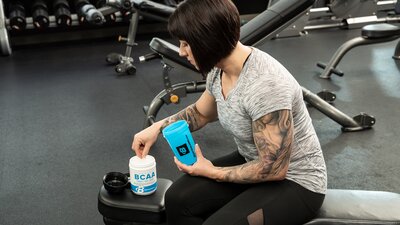At this point, you should know that nutrition has a significant impact on your results. Abs are built in the kitchen, you are what you eat, and all the rest. "Yeah, yeah," you mutter, "I've heard it all before."
Seriously, though: You might be wreaking utter havoc in the gym, but research indicates that what you eat before, during, and after your workout may be the difference between meeting your goals and falling short.
Here's how to harness the power of peri-workout nutrition so you can perform, recover, and grow faster than a weed.
Nutrition Before Your Workout
Carbohydrates
There are few things in the fitness world that incite more arguments and controversy than carbohydrates. Will they make you fat? Do you need them? What kind? At what times? The questions seem endless. There are varying approaches, but if you want to get the most from your workouts and train at your peak, quality fuel is critical.
Carbohydrates are your body's preferred fuel source. I'm not saying you should plow through plates of mashed potatoes and chomp candy bars all day, but you need to fuel your body so it can train at its best.
You want every gram of carbohydrate you consume to be utilized as an immediate fuel source or to restore glycogen levels—you don't want it to be stored as fat. Don't eat more carbs than you need and don't worry about spreading them evenly throughout the day. You can eat the majority of your carbs around your workout.
I like clients to have at least two meals under the belt before training. Your first two meals should include complex carbohydrates like stone-rolled oats or sweet potatoes. Your first meal will provide a couple hours for carbs to get digested and go to work, ensuring blood sugar levels are up and glycogen levels are full prior to training.
Consume your second meal roughly one hour before lifting. Don't get worked up about counting the minutes and seconds, as if five minutes will be the difference between 17- and 18-inch arms. Do the best you can, and try to time it so you can begin training without a lot of food in your gut—running to the garbage can to yak just isn't fun. Most people can benefit from 40 grams of carbs before they train.
Fast-Absorbing Protein
Research has indicated that users of whey protein prior to training will illicit better results than those using other protein sources (or none at all).
This is most likely due to the anti-catabolic and anabolic signaling effects of the branched-chain amino acids (BCAAs) present in whey protein—particularly leucine. Whey has a considerably higher concentration of BCAAs than other proteins.
There are many other benefits, as well. Studies have shown that pre-workout protein intake will increase resting energy expenditure by an average of 6-6.5% for up to 48 hours.[1] Pre-workout protein will also blunt cortisol through the day, an effect that wasn't seen in control groups that were fasted or had ingested carbs only.
Protein and amino acids also spare carbs. People often assume that when the body runs out of carbohydrate fuel, it switches to fatty acids for fuel. That process is typically too slow for high-intensity training. To provide fuel more quickly, amino acids are rapidly broken down and converted to sugar in a process known as gluconeogenesis. If those amino acids aren't in the blood supply, guess where they come from? Yep, your 18-inch biceps. For those of us who are dieting, some extra aminos in our bloodstream may help preserve our lean mass.
Now some of you heavy macro-counters may have reservations about consuming protein pre-workout, especially if you are dieting down. If that's the case, use 10-15 grams of BCAAs instead.
This should provide similar effects and elevate net protein synthesis. Pre-workout BCAAs may even help low-carb dieters burn more fat.[2]
Creatine Monohydrate
For people with strength or hypertrophy goals, consider supplementing with creatine monohydrate. While there are many forms of creatine available, I prefer micronized creatine monohydrate because it's the most studied, solid, tried-and-true creatine on the market.
The body has three primary methods for developing its ultimate energy source, ATP. Which method your body uses depends on the intensity of the activity. For the most intense activities—like weightlifting—the body uses creatine phosphates to produce energy.
Creatine supplementation of 2-5 grams per day will provide greater stores to call on when training, enabling you to train more intensely. In short, creatine can help you train heavier for more reps; it also draws water into the muscles, making you look "full" in appearance.
The timing on the creatine is not critical. You can use it before or after your workout, or anytime throughout the day. If you've been using creating for a while, 2-5 grams once per day will do the trick. If you just started taking creatine monohydrate, you can "load" your muscles with 20-30 grams of creatine per day for 4-5 days.
Beta-Alanine
Basically, beta-alanine helps conserve muscular energy. One of the main causes of fatigue is intramuscular acidosis. When your body produces ATP using the glycolytic and phosphagen systems, the result is metabolic byproducts like excess hydrogen ions. When these hydrogen ions are not cleared fast enough, they bind with pyruvate to produce lactic acid, and elevated levels have been shown to hinder performance, coordination, and skill.
The body can use the L-carnosine to correct this imbalance. L-carnosine is formed from the amino acids L-histidine and beta-alanine. In addition to decreasing hydrogen ion production, it acts as an antioxidant. The limiting factor in carnosine production is the availability of beta-alanine. Research has demonstrated that supplementation can increase muscle carnosine content, eliciting improvements in high-intensity athletes.
This also applies to endurance athletes. The most recent research indicates that the optimal dose of beta-alanine is 4-5 grams.[3] Ideally, the dosage should be spread throughout the day, but 800 mg should come just before a training session.
Nutrition During Your Workout
Most people don't train long enough per session to need additional fuel while they train, especially if they've hit their pre-workout nutrition needs. Depleted dieters, like people preparing for physique competition, may benefit from extra fuel. One of the primary concerns for physique athletes is muscle loss as they whittle down to mid-single-digit body-fat levels. In this state, protein turnover is increased; your body actually needs more protein in a depleted state than it does when you're trying to gain muscle.
In this scenario, branched chain amino acids are a great intra-workout supplement. The amino acids provide some protection from catabolism for those folks in drastic conditions. It probably wouldn't hurt a physique athlete to keep additional BCAAs flowing throughout the day. Increased blood amino acid levels during training may also help elevate net protein synthesis.
Athletes who have unusually long training sessions or burn up extreme amounts of energy may also need intra-workout fuel. This isn't the majority, mind you. Most people drinking Gatorade don't actually need extra fuel for their five-minute warm-up and six-machine training routine. Extra workout fuel is necessary for people who train at a high intensity for well beyond an hour.
An intra-workout cocktail for these individuals should include water, electrolytes, BCAAs (or hydrolyzed protein), and carbohydrates. There are other possibilities, but this is a solid baseline.
Nutrition After Your Workout
Protein
Protein is essential for tissue growth and repair. Since the body is continuously breaking down proteins, our diet must provide sufficient quantities. Although recommended intakes vary and depend on body size and activity, a post-workout protein is almost universally helpful to kickstart muscle repair, recovery, and growth.
Whey protein is incredibly popular because it is rich in BCAAs, digests quickly, is highly bio-available, and has a perfect Protein Digestibility Corrected Amino Acid Score. While whey is excellent after a workout, recent research suggests that a combination of fast- and slow-digesting proteins—like whey and casein—may provide the ultimate post-workout protein cocktail.[4]
Most sources agree that at least 20 grams of whey is necessary to boost muscle repair and recovery.[5] Hydrolyzed whey protein may spike blood amino acid levels faster than regular whey, but won't provide a long-term protein source. To cover your bases, consume a shake containing 40 grams of mixed protein (whey and casein) after your workouts.
BCAAs
In cases of calorie restriction or during periods of long or intense exercise, catabolism of muscle tissue could occur when glycogen and blood sugar are not present in sufficient quantities to fuel activity. Amino acids via dietary protein become very important for any athlete. This is especially true of BCAAs (leucine, isoleucine, and valine), which studies have shown muscles prefer as a source for fuel.[6]
I've included BCAAs after training for the same basic reasons I included them earlier: You can't really do any wrong—unless you decide to drink the entire container in one sitting—and you may provide a fast boost to blood amino levels. I recommend 10 grams of BCAAs after your lifting session, especially if you are in a caloric deficit.
Fast Carbs (Optional)
After a tough workout, your fuel of blood sugar and glycogen should be low. You may have even tapped into reserves to complete your training, especially if you are dieting. Most of us understand the need for protein after training, but many overlook the benefits of fast-acting carbohydrates.
From a physiological perspective, your body's first priority is correcting blood sugar balance and replenishing glycogen, not making your biceps pop. Consume fast-digesting carbohydrates in order to spare protein, replenish glycogen, spike insulin, and speed recovery. Dose recommendations differ, but to maximize recovery, ingest 50-75 grams of high-glycemic carbs after exercise.
*These statements have not been evaluated by the Food and Drug Administration. This product is not intended to diagnose, treat, cure, or prevent any disease.
References
- http://www.ncbi.nlm.nih.gov/pubmed/19997003?dopt=Abstractplus
- https://www.bodybuilding.com/fun/ask-the-macro-manager-pre-post-workout-shakes.html
- J Appl Physiol: Derave, W, ?-zdemir, MS, Harris, RS, Pottier, A, Reyngoudt, A, Koppo K, Wise, JA, & Achten E, Beta-alanine supplementation augments muscle carnosine content and attenuates fatigue during repeated isokinetic contraction bouts in trained sprinters. 2007
- C.M. Kerksick, C.J. Rasmussen, S.L. Lancaster, B. Magu, P. Smith, C. Melton, M. Greenwood, A.L. Almada, C.P. Earnest, and R.B. Kreider, "The effects of protein and amino acid supplementation on performance and training adaptations during ten weeks of resistance training." Journal of strength and conditioning research / National Strength & Conditioning Association, 2006.
- Ingested protein dose response of muscle and albumin protein synthesis after resistance exercise in young men. Moore, DR, Robinson, MJ, Fry, JL, et al. Exercise Metabolism Research Group, McMaster University, Hamilton, Canada. American Journal of Clinical Nutrition 2009, Jan;89(1):161-8. Epub 2008 Dec 3.
- Chang T. W., Goldberg A. L. The metabolic fates of amino acids and the formation of glutamine in skeletal muscle. J. Biol. Chem. 1978;253:3685-3693

